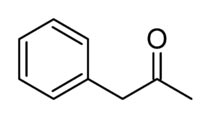
|
Benzyl methyl
ketone
 |
|
|
IUPAC Name:
1-phenylpropan-2-one
Synonyms:
Phenylacetone, Benzyl methyl ketone, Phenyl-2-propanone,
1-Phenylacetone, Methyl benzyl ketone, 1-Phenyl-2-propanone, phenyl
acetone, 2-Propanone, 1-phenyl-, 3-Phenyl-2-propanone, Phenylmethyl
methyl ketone, 1-phenylpropan-2-one, BENZYLMETHYL KETONE, DEA No.
8501, ghl.PD_Mitscher_leg0.660, NSC 9827, CHEBI:52052, EINECS
203-144-4, NSC9827, CPD-7233, ZINC01700205
CAS Registry Number: 103-79-7
Molecular Formula: C9H10O
Molecular Weight: 134.175100 [g/mol] |
HAZARDS IDENTIFICATIONEMERGENCY
OVERVIEW
Potential Health Effects
Eye:
May cause eye irritation.
Skin:
May cause skin irritation.
Ingestion:
May cause gastrointestinal irritation with nausea, vomiting and
diarrhea. The toxicological properties of this substance have not
been fully investigated.
Inhalation:
May cause respiratory tract irritation. The toxicological properties
of this substance have not been fully investigated.
Chronic:
No information found.
FIRST AID MEASURES
Eyes:
Immediately flush eyes with plenty of water for at least 15 minutes,
occasionally lifting the upper and lower eyelids. Get medical aid
immediately.
Skin:
Flush skin with plenty of water for at least 15 minutes while
removing contaminated clothing and shoes. Get medical aid if
irritation develops or persists.
Ingestion:
If victim is conscious and alert, give 2-4 cupfuls of milk or water.
Never give anything by mouth to an unconscious person. Get medical
aid.
Inhalation:
Remove from exposure and move to fresh air immediately. If not
breathing, give artificial respiration. If breathing is difficult,
give oxygen. Get medical aid.
Notes to Physician:
FIRE FIGHTING MEASURES
General Information:
As in any fire, wear a self-contained breathing apparatus in
pressure-demand, MSHA/NIOSH (approved or equivalent), and full
protective gear. During a fire, irritating and highly toxic gases
may be generated by thermal decomposition or combustion.
Extinguishing Media:
In case of fire, use water, dry chemical, chemical foam, or
alcohol-resistant foam.
ACCIDENTAL RELEASE MEASURES
General Information: Use proper personal protective equipment as
indicated
Absorb spill with inert material (e.g. vermiculite, sand or earth),
then place in suitable container. Clean up spills immediately,
observing precautions in the Protective Equipment section. Scoop up
with a nonsparking tool, then place into a suitable container for
disposal.
HANDLING and STORAGE
Handling:
Wash thoroughly after handling. Wash hands before eating. Remove
contaminated clothing and wash before reuse. Use only in a
well-ventilated area. Avoid contact with eyes, skin, and clothing.
Keep away from heat, sparks and flame. Avoid ingestion and
inhalation.
Storage:
Keep away from heat, sparks, and flame. Keep away from sources of
ignition. Store in a cool, dry place. Keep container closed when not
in use.
The Reductive Amination of Benzyl Methyl Ketone
Benzyl methyl ketone can react with ammonia in the
following way:
in which [a]: Raney Nickel, Pt, H2, Al powder in the
presence of HgCl2, Nickel plated Zinc; [b]: 20-170°C, 1-130 atm,
ethanol, methanol.
Reaction conditions can differ widely. (Only low
pressure and low temperature aminations have been encountered so far in
the Netherlands.)
The Oxime Route
Benzyl methyl ketone reacts with hydroxylamine to give
the oxime, which can be hydrogenated to give the amphetamine:
in which [a]: Na (amalgamated), Na (absolute ethanol),
LiAlH4, or H2 and Raney Nickel, nickel, iron, nickel plated zinc; [b]:
20-170°C, 1-130 atm;
Electrolytical reduction has also been reported. Great
differences have been described for the reaction conditions.
The Phenylnitropropene Route
Condensation of benzaldehyde with nitroethane yields
1-phenyl-2-nitropropene. Hydrogenation of the double bond and subsequent
reduction of the nitro group gives the amphetamine:
in which [a]: LiAlH4, H2 and Raney Nickel or Pd/C;
[b]: 20-100°C, 1-80 atm, CH3OH, C2H5OH, H2O/HCOOH, C2H5OH.

 Note:
These API/ chemicals are designated as
those that are used in the manufacture of the controlled substances and
are important to the manufacture of the substances. For any (Control
Substance) products Import and Export *** subjected to your country
government laws /control substance ACT. Note:
These API/ chemicals are designated as
those that are used in the manufacture of the controlled substances and
are important to the manufacture of the substances. For any (Control
Substance) products Import and Export *** subjected to your country
government laws /control substance ACT.
Note /Government Notification:
N/A
|










